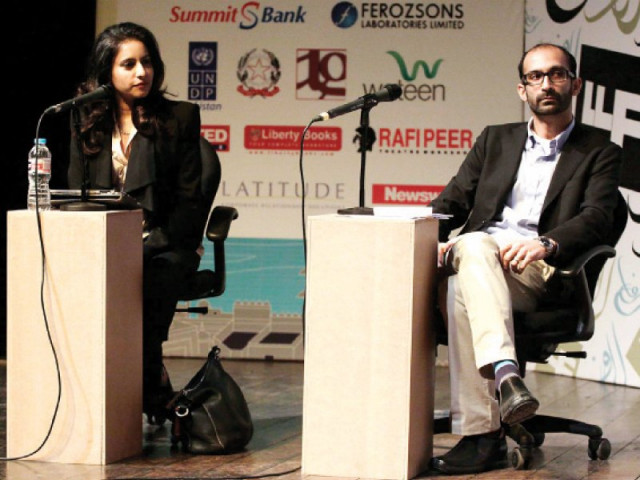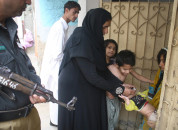Responsible reporting: Of truth and national interest
Prospects of Kabul after US troops pull out, efficacy of drone attacks discussed.

Prospects of Kabul after US troops pull out, efficacy of drone attacks discussed.
“To do interesting work, journalists will sometimes have to break the law,” said journalist Shahan Mufti. Mufti, along with journalists Zahid Hussain and Matthieu Aikins, was speaking at a session Reportage on Pakistan on Saturday at the Lahore Literature Festival.
Mufti cited the example of the NSA leaks and the discussion in the US about journalist Glenn Greenwald’s ethical responsibility. He said “Journalists are not just citizens, they have the responsibility to uphold democracy.”
In her introduction, Moderator Munizae Jahangir, reminded the audience that three journalists had been killed in Pakistan this year and that last year the death count had been 11. Hussain clarified that most of the journalists had been killed in Tribal Areas. He said resistance journalism had been present during General Ziaul Haq’s regime. He added that with regard to journalism there was no comparison between General Ziaul Haq’s regime and General Pervaiz Musharraf’s. During the former, stories were pulled out of newspapers, blank pages were sent to print and journalists were jailed and whipped.
Speaking about writing from and on Afghanistan, Aikins said security reasons had placed limitations on journalists. He said journalists had come to Afghanistan on the coat tails of the US military and tried to be objective but that could be difficult at times. “The Afghanistan government has not imposed censorship on foreign media as yet. However, I can’t write on Balochistan because I like working in Pakistan.”
Mufti added that journalists were in a quandary with regard to the war in Afghanistan. “The Americans are fighting a war in Afghanistan, they and the NATO are not supposed to be in Pakistan. But, this war is also being fought in Pakistan. We have to cover a war that is not ‘really here’.”
Aikins said journalists needed to oppose the State Department and the military. “What are Pakistani journalists resisting?” he asked. He said he tried to produce work that challenged preconceptions. “I look at war crimes by the US military, drug trafficking by our allies. Writing about the Taliban just fuels stereotypes about this region.”
Mufti added that when looking at Pakistan the western press wanted to hear about Balochistan and the FATA. “It is difficult writing about the Punjab because of my audience.” He said that journalists needed to be clear whether they are reporting on Pakistan to explain Pakistan to America or if they are reporting to explain the war in Afghanistan.
Aikins asked what the most censored topic in Pakistan is. Jahangir said there were many, such as labour issues. Unlike Bangladesh, Aikins said, there was hardly any reporting on labour issues in Pakistan. Aikins added that reporters must build connections with other journalists and social movements to create a support network.
Speaking about the US troops being pulled out from Afghanistan this year, Hussain said “More people are being killed in Pakistan than Afghanistan. After this year is over the war will continue to be fought on both sides of the border.” He added that the narrative that the country was being controlled by a minority had made the majority fearful.
“Maulana Abdul Aziz came on television to declare that they had 50 female suicide bombers. In what civilised nation does this happen? Freedom of the press is a double edged sword”, he added.
Mufti said he could not predict the scenario after the US troops pulled out. He said the dynamic and context of reporting would change. He pointed out that Malala Yousafzai and Trayvon Martin were shot around the same time but their narratives had played out in very different ways.
Aikins added that the elections in Afghanistan would not be the watershed moment that they were being touted as. “The order in Kabul won’t change fundamentally. It will be a more gradual shift.”
Asked about the efficacy of drone attacks, Hussain said that he did not agree with them as a long-term solution as they were counterproductive.
Published in The Express Tribune, February 23rd, 2014.



















COMMENTS
Comments are moderated and generally will be posted if they are on-topic and not abusive.
For more information, please see our Comments FAQ